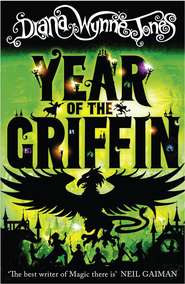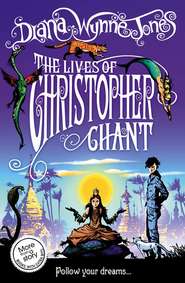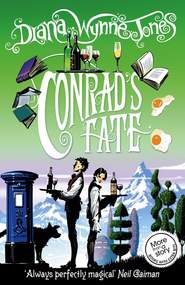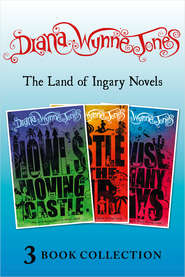По всем вопросам обращайтесь на: info@litportal.ru
(©) 2003-2024.
✖
Enchanted Glass
Настройки чтения
Размер шрифта
Высота строк
Поля
Andrew took this to mean yes. “I’m not a professor,” he pointed out mildly. “Just a mere academic.”
Mrs Stock took no notice of this. To her mind this was just splitting hairs. Everybody at a university was to her a professor, unless they were students of course, and therefore even worse. So she told everyone in Melstone that old Jocelyn’s grandson was a professor. Andrew soon became accustomed to being addressed as “Professor”, even by people who wrote to him from elsewhere about details of folklore or asking questions about magic.
He went to give Mr Stock the gardener his legacy of five hundred pounds. “And I do hope you’ll continue your admirable work for me too,” he said.
Mr Stock leaned on his spade. He was no relation to Mrs Stock, not even by marriage. It was simply that a good half of the people in Melstone were called Stock. Both Mr and Mrs Stock were extremely touchy on this matter. They did not like one another. “I suppose that old bossyboots says she’s carrying on for you?” Mr Stock asked aggressively.
“I believe so,” Andrew said.
“Then I’m staying to see fair play,” Mr Stock said and went on banking up potatoes.
In this way, Andrew found himself employing two tyrants.
He did not see them this way of course. To him the two Stocks were fixtures, his grandfather’s faithful servants, who had worked at Melstone House since Andrew had first visited the house as a child. He simply could not imagine the place without them.
Meanwhile, he was extremely happy, unpacking his books, going for walks and simply being in the house where he had spent so many fine times as a boy. There was a smell here — beeswax, mildew, paraffin and a spicy scent he could never pin down — which said Holidays! to Andrew. His mother had never got on with old Jocelyn. “He’s a superstitious old stick-in-the-mud,” she said to Andrew. “Don’t let me find you believing in the stuff he tells you.” But she sent Andrew to stay there most holidays to show that she had not exactly quarrelled with her father.
So Andrew had gone to stay with old Jocelyn and the two of them had walked, over fields, through woods and up Mel Tump, and Andrew had learned many things. He did not remember old Jocelyn teaching him about anything magical particularly; but he did remember companionable nights by the fire in the musty old living room, with the curtains drawn over the big French windows, when his grandfather taught him other things. Old Jocelyn Brandon had a practical turn of mind. He taught his grandson how to make flies for fishing, how to mortice joints, and how to make runestones, origami figures and kites. They had invented riddles together and made up games. It was enough to make the whole place golden to Andrew — though he had to admit that, now he was living here, he missed the old man rather a lot.
But owning the place made up for that somewhat. He could make what changes he pleased. Mrs Stock thought he should buy a television for the living room, but Andrew disliked television so he didn’t. Instead, he bought a freezer and a microwave, ignoring the outcry from Mrs Stock, and went over the house to see what repairs were needed.
“A freezer and a microwave!” Mrs Stock told her sister Trixie. “Does he think I’m going to freeze good food solid, just for the pleasure of thawing it again with rays?”
Trixie remarked that Mrs Stock had both amenities in her own house.
“Because I’m a working woman,” Mrs Stock retorted. “That’s not the point. I tell you, that man lives in a world of his own!”
Great was her indignation when she arrived at the house next day to find that Andrew had moved all the furniture around in the living room, so that he could see to play the piano and get the best armchair beside the fire. It took Mrs Stock a whole morning of grunting, heaving and pushing to put it all back where it had been before.
Andrew came in from inspecting the roof and the outhouse in the yard after she had gone, sighed a little and moved everything to where he wanted it again.
Next morning, Mrs Stock stared, exclaimed and rushed to haul the piano back to its hallowed spot in the darkest corner. “World of his own!” she muttered, as she pushed and kicked at the carpet. “These professors!” she said, heaving the armchair, the sofa, the table and the standard lamps back to their traditional places. “Damn it!” she added, finding that the carpet had now acquired a long slantwise ruck from corner to corner. “And the dust!” she exclaimed, once she had jerked the carpet flat. It took her all morning to clean up the dust.
“So you’ll just have to have the same cauliflower cheese for lunch and supper,” she told Andrew, by way of a strong hint.
Andrew nodded and smiled. That outhouse, he was thinking, was going to fall down as soon as his grandfather’s magic drained from it. Likewise the roof of the house. In the attics, you could look up to see cobwebby patches of sky through the slanted ceilings. He wondered whether he could afford all the necessary repairs as well as the central heating he wanted to install. It was a pity he had just spent so much of his grandfather’s remaining money on a new computer.
In the evening, after Mrs Stock had gone, he fetched a pizza out of his new freezer, threw away the cauliflower cheese and, while the pizza heated, he moved the living room furniture back the way he wanted it.
Dourly, the next day, Mrs Stock moved it back to where tradition said it should be.
Andrew shrugged and moved it back again. Since he was employing the method he had used on his ditched car, while Mrs Stock was using brute force, he hoped she would shortly get tired of this. Meanwhile, he was getting some excellent magical practice. That evening, the piano actually trundled obediently into the light when he beckoned it.
Then there was Mr Stock.
Mr Stock’s mode of tyranny was to arrive at the back door, which opened straight into the kitchen, while Andrew was having breakfast. “Nothing particular you want me to do today, so I’ll just get on as usual,” he would announce. Then he would depart, leaving the door open to the winds.
Andrew would be forced to leap up and shut the door before the wind slammed it. A slam, as his grandfather had made clear to him, could easily break the delicate coloured glass in the upper half of the door. Andrew loved that coloured glass. As a boy, he had spent fascinated hours looking at the garden through each different-coloured pane. Depending, you got a rose-pink sunset garden, hushed and windless; a stormy orange garden, where it was suddenly autumn; a tropical green garden, where there seemed likely to be parrots and monkeys any second. And so on. As an adult now, Andrew valued that glass even more. Magic apart, it was old, old, old. The glass had all sorts of internal wrinkles and trapped bubbles, and its long-dead maker had somehow managed to make the colours both intense and misty at once, so that in some lights, the violet pane, for instance, was both a rich purple and a faint lilac grey at one and the same time. If a piece of that glass had broken or even cracked, Andrew’s heart would have cracked with it.
Mr Stock knew that. It was his way of ensuring, like Mrs Stock, that Andrew did not make any changes.
Unfortunately for Mr Stock, Andrew went over the grounds as carefully as he went over Melstone House itself. The walled vegetable garden was beautiful. Mr Stock’s great ambition was to win First Prize in all the vegetable classes at the Melstone Summer Fete, either from his own garden down the road or from Andrew’s. So the vegetables were phenomenal. But for the rest, Mr Stock was content merely to mow lawns. Andrew shook his head at the flower garden and winced at the orchard.
After a couple of months, while he waited for Mr Stock to mend his ways and Mr Stock went on as usual, Andrew took to leaping up as soon as Mr Stock appeared. Holding the precious door open ready to shut again after Mr Stock left, he would say things like, “I think today would be a good time to get rid of all those nettles in the main flowerbed,” and, “Give me a list of the shrubs we need to replace all the dead ones and I’ll order them for you,” and, “There’ll be no harm in pruning the apple trees today: none of them are bearing fruit.” And so on. Mr Stock found himself forced to leave his vegetables, often for days on end.
Mr Stock took his revenge in his traditional manner. The following Monday, he kicked open the back door. Andrew was only just in time to stop it crashing against the inside wall, even though he had cast aside his toast and leaped to the door handle at the sight of Mr Stock’s hat silhouetted through the coloured glass.
“You’ll need both hands,” Mr Stock said. “Here.” And he placed a vast cardboard box loaded with vegetables in Andrew’s arms. “And you’re to eat these all yourself, see. Don’t you let that old bossyboots go pinching them off you. And she will. I know her greedy ways. Puts them in her bag and scuttles off home with them if you give her the chance. So you eat them. And don’t try chucking them away. I’ll know. I empty the bins. So. Nothing particular you want me to do today. I’ll just get on, shall I?”
“Well, actually there is,” Andrew said. “The roses need tying in and mulching.”
Mr Stock glared at him incredulously. This was rebellion.
“Please,” Andrew added in his usual polite way. “I’ll be—!” said Mr Stock. And turned and trudged away.
Andrew, very gently, nudged the door closed with his foot and dumped the cardboard box beside his toast. It was that or drop it, it was so heavy. Unpacked, it proved to contain six enormous onions, a bunch of twelve-inch carrots, a cabbage larger than Andrew’s head, ten peppers the size of melons, a swede like a medium-sized boulder and a vegetable marrow like the body of a small crocodile. The spaces were carefully packed with overripe peapods and two foot runner beans. Andrew grinned. This was all the stuff that would not be up to the standard of Melstone Fete. He left a few of the most edible things out on the table and packed the rest back in the box, which he hid in the corner of the pantry.
Mrs Stock found it of course. “He’s never palmed his rejects off on us again!” she pronounced. “The size of them! All bulk and no taste. And what am I to do for potatoes? Whistle? Really, that man!” Then she took her coat off and went to put the furniture back again. They were still at that.
The next day, Mr Stock kicked the door open on behalf of a box full of fourteen lettuces. On Wednesday, for variety, he accosted Andrew as Andrew went out to check the state of the garden walls and presented a further cardboard box containing ten kilos of tomatoes and a squash like the deformed head of a baby. On Thursday, the box contained sixteen cauliflowers.
Andrew smiled nicely and accepted these things, staggering a bit under their weight. This had happened when his grandfather annoyed Mr Stock too. They had often wondered, Andrew and his grandfather, if Mr Stock collected cardboard boxes and stored them ready to be annoyed with. Andrew presented the tomatoes to Mrs Stock.
“I believe you had better make some chutney,” he said.
“And how do you expect me to find time for that, when I’m so busy—” She broke off, mildly embarrassed.
“Moving the furniture in the living room?” suggested Andrew. “Perhaps you could bring yourself to leave it for once.”
Mrs Stock found herself making chutney. “World of his own!” she muttered over her seething red, vinegary saucepan, and occasionally, as she spooned the stuff into jars, and it slid out and pooled stickily on the table, “Professors! Men!” And, as she got her coat on to leave, “Don’t blame me that the table’s covered in jars. I can’t label them until tomorrow and they’re not going anywhere until I have.”
Once he was alone, Andrew did as he had done every evening that week. He heaved the latest box out of the pantry and carried it outside to where the lean-to of the woodshed made a flattish slope level with his head. With the help of a kitchen chair, he laid the vegetables out up there. Too high for Mr Stock to see, his grandfather had remarked, or Mrs Stock either.
Tomatoes, squash and cauliflowers, were all gone in the morning, but the marrow remained. Careful looking showed a slightly trampled place in the grass beside the woodshed, but Andrew, remembering his grandfather’s advice, enquired no further. He took the marrow back and tried to cut it up to hide in the freezer. But no knife would penetrate the crocodile skin of the thing and he was forced to bury it instead.
Friday brought a gross of radishes from Mr Stock and five bloated aubergines. It also brought Andrew’s new computer. Finally. At last. Andrew forgot house, grounds, radishes, everything. He spent an absorbed and beatific day setting up the computer and beginning the database for his book, the book he really wanted to write, the new view of History.
“Would you believe, it’s a computall now!” Mrs Stock told her sister. She never could get that word right. “Sitting there all day, patter-patter, like dry bones, fair gives me the creeps. And if I ask him anything, it’s, ‘Do as you think best, Mrs Stock’. I could have given him the boiled teacloths for lunch and he wouldn’t have noticed!”
Well, he was a professor, Trixie pointed out, and professors were well known to be absent-minded. And in her opinion, men were all children at heart anyway.
“Professors! Children!” Mrs Stock exclaimed. “I tell you, it’s worse than that. The man needs a minder to keep him in order!” Then she went quiet, struck with an idea.
Mr Stock looked proprietorially in through the window of Andrew’s ground-floor study. He surveyed the new computer and the explosion of thick books and papers around it, on the desk, draping off it, on the chairs, floor, everywhere, and the chaos of wires and cables around these. He was struck with an idea too. The man needed someone to keep him in order, someone to stop him interfering with those who had real work to do. Hm.
Mr Stock, thinking deeply, dropped round at his brother-in-law’s cottage on his way home.
It was a very pretty cottage, thatched roof and all, although Mr Stock never could see why a man in Tarquin’s condition should put up with an old place just because it looked good. Mr Stock much preferred his own modern bungalow with its metal frame windows. Tarquin’s windows were all crooked and didn’t keep the draught out. But Mr Stock could not avoid glowering jealously at the garden. Tarquin O’Connor had some kind of touch, even if it was only with flowers. The roses that lined the path to the front door now. Mr Stock could not approve these romantic, old-fashioned sort of roses, but he had to admit they were perfect of their kind, healthy, big clusters of cups, rosettes, whorls, and buds and buds coming on. More prizes at the Fête for Tark, for sure. And the bushes so well controlled that not one thorny branch strayed to catch a visitor coming between them to the door. While beyond them — well — a riot. Scents in the air. Enviously, he knocked on the door.











